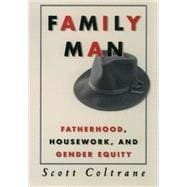
Note: Supplemental materials are not guaranteed with Rental or Used book purchases.
Purchase Benefits
Looking to rent a book? Rent Family Man Fatherhood, Housework, and Gender Equity [ISBN: 9780195119091] for the semester, quarter, and short term or search our site for other textbooks by Coltrane, Scott. Renting a textbook can save you up to 90% from the cost of buying.
| Parenting in Transition | p. 3 |
| New Fatherhood Ideals | p. 5 |
| Reluctant Pioneers | p. 8 |
| Nostalgia for the Past and Dreams for the Future | p. 21 |
| Organization of the Book | p. 22 |
| Separate Spheres | p. 25 |
| Separate Spheres and Gender Inequality | p. 27 |
| A Brief History of Separate Spheres | p. 27 |
| Increasing Diversity of Family Types | p. 44 |
| Family Work in the 1970s and 1980s | p. 46 |
| Changing Patterns of Family Work | p. 51 |
| Who Does What? | p. 52 |
| Interviews with Shared Parenting Families | p. 55 |
| Emerging Issues and Patterns | p. 82 |
| Providing and Caring | p. 84 |
| Research on Mexican-American Families | p. 84 |
| Interviews with Two-Job Families | p. 86 |
| Sharing and Reluctance | p. 111 |
| Why Do Couples Share? | p. 116 |
| Personal Motivations | p. 116 |
| The Importance of Timing | p. 126 |
| Social Networks and Household Labor | p. 133 |
| Explaining Family Work | p. 151 |
| Theories of Household Labor Allocation | p. 151 |
| The National Survey of Families and Households | p. 161 |
| What Do We Know? | p. 172 |
| Gender, Culture, and Fatherhood | p. 177 |
| The Legacy of Margaret Mead | p. 177 |
| Gender Relations in Pre-Modern Societies | p. 180 |
| Wild Men and Father Hunger | p. 192 |
| The Dangers of Celebrating Difference | p. 194 |
| The Future | p. 199 |
| Family Work | p. 200 |
| Social Trends | p. 201 |
| Predicting Future Sharing | p. 225 |
| Notes | p. 207 |
| Index | p. 285 |
| Table of Contents provided by Blackwell. All Rights Reserved. |
The New copy of this book will include any supplemental materials advertised. Please check the title of the book to determine if it should include any access cards, study guides, lab manuals, CDs, etc.
The Used, Rental and eBook copies of this book are not guaranteed to include any supplemental materials. Typically, only the book itself is included. This is true even if the title states it includes any access cards, study guides, lab manuals, CDs, etc.